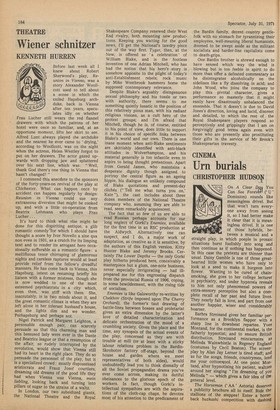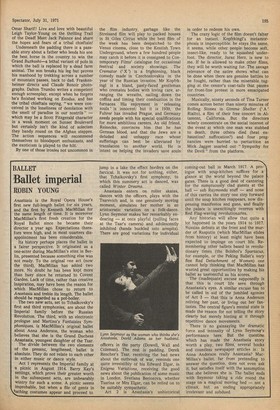CINEMA
Urn burials
CHRISTOPHER HUDSOf
On A Clear Do You Can See Foret (' ' Dominion) sounds like meaningless drivel. But that won't turn everyone away from seeing it, so I had better make it clear that it is meaningless drivel. It is one of those hybrids, between a musical and a straight play, in which poeple in prosaic situations burst foolishly into song and then continue as if nothing has happened. In this case the pretexts are thinner than usual. Daisy Gamble is one of those greathearted little women who have only to look at a seed to make it burgeon into flower. Wanting to be cured of chainsmoking, she goes to her college lecturer in psychiatry, and under hypnosis reveals to him not only phenomenal powers of extra-sensory perception but also a complete recall of her past and future lives. They nearly fall in love, and part from one another happier, wiser and considerably hoarser.
Barbra Streisand gives her familiar performance as a Brooklyn flapper with a sharp line In downbeat repartee. Yves Montand, for the continental market, is the fatherly hypnotist; and to ensure British distribution, Streisand reincarnates as Melinda Wainwhistle in Regency England (costumes by Cecil Beaton). The screenplay by Alan Jay Lerner is tired stuff; and as for the songs, friends, countrymen, lend me your cottonwool. At one point Mon tend, after hypnotising his patient, waltzes around her singing "I'm dreaming of you Melinda" — which gives a fair idea of the general level.
The Horseman (' AA' Astoria) deserves a publicity brochure all to itself. Ride the stallions of the steppes! Enter a horseback buzhashi competition with dashing Omar Sherif ! Live and love with beautiful Leigh Taylor-Young on the thrilling Trail of the Dead! Meet Jack Palance and share the hopes and fears of a tribal chieftain!
Underneath the padding there is a passable story about a father who lends his son the best horse in the country to win the Grand Buzkashi—a lethal variant of polo in which the ball is replaced by a dead farm animal. The son breaks his leg but proves his manhood by trekking across a number of mountain passes, back to dad. Frankenheimer directs and Claude Renoir photographs. Dalton Trumbo writes a competent enough screenplay, except when he forgets he's finished working on Exodus. and has the tribal chieftain saying, " we were conceived in the loneliness of desolation with the smell of paradise in our nostrils " — which may be a Scott Fitzgerald character in a weak moment on Sunset Boulevard but certainly isn't the kind of solecism they bandy round on the Afghan steppes. The action sequences will recommend themselves to bloodsport enthusiasts, and the exoticism is played to the hilt.
By one of those ironies not uncommon in the film industry, garbage like the Streisand film will play to packed houses in St Giles Circus while the best film of the week has been despatched to the Venus cinema, close to the Kentish Town Underground, where a few hundred people may catch it before it is consigned to Contemporary Films' catalogue for occasional festival and society showings. The Cremator (' X ') is a frightening, black comedy made in Czechoslovakia in the year of the Russian invasion. Mr Kopfrkingl is a bland, pasty-faced gentleman who cremates bodies with loving care, arranging the wreaths, nailing down the coffins and timing their combustion in the furnaces. His enjoyment in 'releasing souls ' is innocent: but it is 1939, the Fuhrer has invaded Prague, and Germany needs people with his special qualifications for more ambitious careers. An old friend, Reinecke, convinces him that he has German blood, and that the Jews are a deluded and unhappy race whose sufferings can best be alleviated by translation to another world. He is intent on helping the invaders save souls in order to redeem his own.
The crazy logic of the film doesn't falter for an instant. Kopfrkingl's metamorphosis is imperceptible: he stays the same, it seems, while other people become soft, insect-like, ready to be squashed underfoot. The director, Juraz Herz, is new to me. If he is allowed to make other films, they will be worth waiting for. The savage relevance of the satire shows what can be done when there are genuine battles to be fought, rather than the miserable tugging at the censor's coat-tails that passes for front-line protest in more emacipated countries.
Musically, ninety seconds of Tina Turner comes across better than ninety minutes of Rolling Stones in Gimme Shelter (' A ' Rialto), a film of their free concert in Altamont, California. But the directors wisely concentrate on the social interest of the event at which one man was stabbed to death, three others died (heat exhaustion? suffocation?) and four pregnancies were hurried to partui ition as Mick Jagger snarled out "Sympathy for the Devil" from the platform.











































 Previous page
Previous page